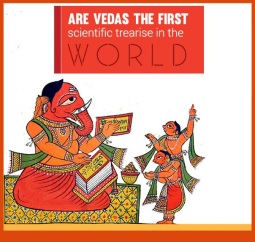said a British lady sitting next to me at Dubai Airport a month ago. Before I could come out of the superior air I felt around myself, there she was all set to board her flight.
With a head high on pride, I boarded the plane back to India.
It was not long before I asked myself, what is it that the lady knows about India which I don’t ?
I have never considered myself very lucky for not being born in Britain or US or for that matter any other non-asian country
It was then that my quest to know my own country which was also by far the most enriching, finally began.
Recently found fossils near Nepal border are more than a proof that humans existed in India even 10, 000 years ago but it was only in 1700 B.C.E, that the most prosperous era of Indian history began, an era known as the “Vedic period”. It was during this period that the worlds most thrilling and inspiring hindu texts called Vedas were written. Lets delve deeper into these texts.
- The Vedas have been passed on from generations to generations for over 3000 years through the written manu scripts as well as the oral tradition. The vedic scholars had always believed that the way the tone in which the vedic mantras are read is as important as the text in them. You would be amazed to know that Indians had a highly developed mnemonic techniques to by heart Vedas even 3,000 years ago. To set the context right, complete corpus of Vedic mantras as collected in Bloomfield’s Vedic Concordance (1907) consists of some 89,000 padas (metric feet), of which 72,000 occur in the four Samhitas (source).
- The language used to write these hindu manu scripts is till today one of the most sophisticated languages ever known to mankind, the language which is the mother of all the European and Latin languages spoken today, the only language capable of becoming a programmable language, yes I am talking about our very own Sanskrit language!

- A perfectly context free language which can be constructed by just under 4000 grammar rules defined by Panini (the most famous sanskrit grammarian) around 2500 years ago.
- Its Object oriented nature further makes it a language suitable for programming, surprisingly, not even a need of adding a -single class has been felt since Panini’s work.
- The earth has always been refered to be as “Jagat” in all the vedic manuscripts. what does “Jagat” mean in sanskrit? Jagat means “jiski gati hai” (one that moves).. but euroepan scientist discovered that earth moves in 1600AD and vedas were written in 1500BC.
- India is also known to have the oldest knowledge of all kinds of surgeries. Sushruta was an ancient Indian surgeon who laid the foundation for Ayurveda – the earliest school of medicine. His book “Sushruta Samhita” had a collection of more than 1100 illnesses, 700 plants, and a detailed study of the human anatomy.
- Now comes the most important contribution of Indians without which no worthwhile scientific discovery could have ever been made.”
- it all started with nothing, when Aryabhatta assigned a value “Shunya” to nothing. Which also gave birth to the hindu arabic place value system.
- Indian mathematicians as Aryabhatta, Bramhagupta, Bhaskara, Madhava and many other mathematicians from the famous Kerala mathematics school made a whopping contribution too, by introducing the concepts like infinite series, trigonometric series, Fibonacci numbers, morse code, recursion, pascals triangle. Yes, all these concepts have Indian origin!
- Indians were so sophisticated in their scientific knowledge, that Vedas and Upanishads mentioned the circumference of earth with an accuracy of 70 miles, not only this, there has been a clear mention in Vedas about the Helio centric theory, which says, all the planets and atmosphere is attached around the sun with strings!
- Indians knew the art of Zinc extraction since 200 B.C.E, in fact till 1600 AD Indians were the only people who knew how to extract zinc.
- It was in India that a first and till now the last perfectly rust free iron pillar was built. It still stands tall in Delhi today.
- Indians have always believed in mental calculations, Vedas had a lot of calculation techniques which we today call “vedic maths” and this is more famous in Europe than in India better known as “speed mathematics”. – a compulsory course in many of the high schools.in Europe today.
I can probably go on and on with the list of Indian blessings to the world. Perhaps the only thing more difficult than being indifferent to India would be to describe or understand contribution of Indians in a few hundred words. Irrespective of who has ruled us in the last two centuries, of how corrupt India is today, of how crazily we are aping the West, I would be a proud Indian till I die! And maybe after that, after all it’s our very own Rig Veda that says that – “Life, death and rebirth are inevitable”, that there is a life after death.
– A proud Indian

